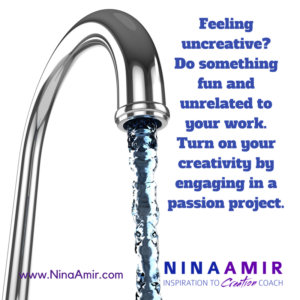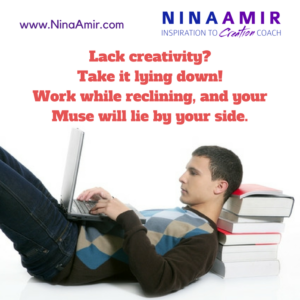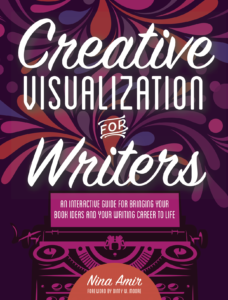Would you like to be able to turn on your creativity at will? Sure you would.
If you could, whenever you needed to solve a problem, find a solution, produce something, you would be able to do it easily.
I work with a lot of writers and aspiring authors. Some of them tell me they have trouble accessing their creativity.
That condition makes them unproductive. Can you relate?
It makes sense. If you don’t feel creative, you think you’re stuck.
You could be stuck on a writing or business-related project, a proposal, how to fix your car, how to fund the money to paint your house. You need creativity for all kinds of problem-solving situations a well as to move forward and achieve goals.
5 Ways to Turn on Creativity
So how do you turn on creativity at will? There are many ways to do this.
My new book, Creative Visualization for Writers: An Interactive Guide for Bringing Your Book Ideas and Career to Life, has a whole section that offers creativity exercises to help you create anything but, in particular, written projects. I want to share a few of the creativity exercises from Creative Visualization for Writers because they pertain to anyone who wants to be creative on demand.
Let’s say that you feel stuck and uncreative. You’re having a hard time completing work because you can’t tap into that place within that holds the good ideas. So what can you do?
1. Sit Outside the Box
I realize you probably don’t sit in a big cardboard box to work. However, a study showed that people who took their work outside the box were more creative—literally outside the box. Some of them sat in a box, and some of them sat outside a box. Those working outside the box were more creative.
Especially if you work a cubicle, try working outside your box-like office. If you work at home, and you have a door on your office, think of that room as a box, too.
Close the door to your office and sit outside to work. Put your back up against the door or just move outside the box. If you work in a cubicle, then stand in the hallway or somewhere else outside your box.
If you feel boxed in, find somewhere else to go. Go to a coffee shop, out on your deck, a park, your living room, the break room, or the library – anywhere that is outside your normal working area and see if that turns on your creativity.
2. Work Sleepy
 I’m a high-performance coach and typically recommend people get seven to eight hours of sleep if they want to be creative and productive. But studies that show that we can access creativity when we’re sleepy.
I’m a high-performance coach and typically recommend people get seven to eight hours of sleep if they want to be creative and productive. But studies that show that we can access creativity when we’re sleepy.
Let’s say it’s late in the day, and you’re starting to get a little drowsy. Ever had that experience? You feel like you can’t do good work at that moment.
You could meditate or take a power nap so you come back refreshed and ready to work and access your creativity.
Or…you could try to generate some ideas or solutions.
Your mind works differently when you feel sleepy. You stop hanging on to old ideas and ways you’ve done things before. Instead, you access new ideas, concepts, and ways to solve problems. So, when you feel like it’s nap time, pull out a pad of paper and do some brainstorming about your project.
3. Work at Off Times
In a similar vein, studies show that sometimes we are more creative at off times rather than prime times.
Are you a morning person or a night person? Either morning or night is your prime time—the time you feel most productive and energetic—and creative.
Most people believe that if they need to do something, like write a book, blog post, or report—or figure out anything, it’s best to do it at their prime time. If you’re a morning person, you say, “I need to do write in the morning. If I’m busy on a particular morning, I don’t write that day”—or whatever your project.
In fact, as a morning person, you might be more creative at night. If you’re a night person, getting up early to work on a project might access your creativity.
4. Work Lying Down
 Most of us spend our days sitting at desks. However, these studies show that reclining while you work gets your creative juices flowing.
Most of us spend our days sitting at desks. However, these studies show that reclining while you work gets your creative juices flowing.
Take your laptop and lie on your bed or a couch with while you work. Or sit in a comfy chair—but not upright.
If that doesn’t work for you, try standing up to work. You might have more energy when on your feet or activate different parts of your brain because you’re up and moving.
5. Take on a Side Project
Last, get away from work for a bit and do something fun or inspiring. Specifically, take on a creative side project.
Find something that you want to do that may have nothing to do with your work or the project with which you are struggling. Maybe you’ve always wanted to learn to play guitar or piano or to take up skydiving or gardening. Doing so can become your side project.
I realize your schedule is full. I know you feel your creativity is affected by your lack of time and abundance of commitments. You feel overwhelmed, and that leaves you drained and uncreative.
I get it. I’m often there with you.
But make a little bit of time—10 minutes, 15 minutes, half an hour—for a creative side project. Then notice if you find yourself generating more ideas and solutions while you are enjoying this hobby or when you are back at work.
Use these exercises to turn on your creativity at will. You’ll also end up more productive. When you lack creativity, it takes you longer to produce your work—whatever that is.
Let me know if the exercises I’ve described help you create more inspired results as you tap into your creativity in new ways.
 Sometimes you need more than an idea and writing skill to realize your dream of successful authorship. Create a Visualization for Writers: An Interactive Guide for Bringing Your Book Ideas and Your Writing Career to Life, provides the “more” you need and want. It contains over 100 exercises on visualization, goal setting, visioning, inspired action, creativity, and focus that ask you to imagine, draw, affirm, write about what you want to create as a writer.
Sometimes you need more than an idea and writing skill to realize your dream of successful authorship. Create a Visualization for Writers: An Interactive Guide for Bringing Your Book Ideas and Your Writing Career to Life, provides the “more” you need and want. It contains over 100 exercises on visualization, goal setting, visioning, inspired action, creativity, and focus that ask you to imagine, draw, affirm, write about what you want to create as a writer.

